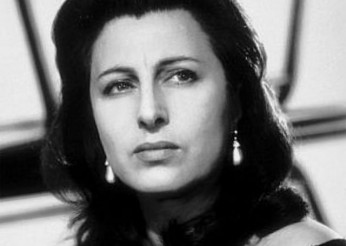(Rome, Italy, March 7, 1908 - Rome, Italy, September 26, 1973)
Anna Magnani was one of the most famous post-WWII Italian actresses. She studied at the Rome Academy for Dramatic Arts, supporting herself by singing in night clubs and performing in a burlesque. She first appeared on film in the silent film Scampolo (1928) in a small role. While singing in San Remo in 1933 she met Goffredo Alessandrini, a film director she married two years later. Through her husband she met the director Nunzio Malasomma, who gave her a role in his film La cieca di Sorrento (1934). Even though she continued to work in the theater and acted in many of Agatha Christie’s plays, her theater success did not divert her from film. Her first larger role was in Vittorio De Sica’s film Teresa Venerdě (1941). Afterwards she appeared in a supporting role in La fortuna viene dal cielo (1942). After her son’s birth in 1942 she stopped working for about a year. She returned to film in 1943 during a time when the war impoverished working conditions and performing foreign plays was banned. She appeared in several, mostly unnoticed, films such as L' ultima carrozzella (1943), Campo de' fiori (1943) and Il fiore sotto gli occhi (1944). The role of Pina in Rim, otvoreni grad (Roma, cittá aperta, 1945) by Roberto Rossellini, the first and most important Italian neorealism film, brought her international fame and ensured main roles in her next films. She starred in Abbasso la miseria! (1945) and Abbasso la ricchezza! (1946) by Gennaro Righelli and Il bandito (1946) by Alberto Lattuada. For her role in L' onorevole Angelina (1947) by Luigi Zampa, on which she also worked as a co-screenwriter, she won an award at the Venice Film festival in 1947. Afterwards she starred in L' amore (1948) by Roberto Rossellini, Volcano (1950) by William Dieterle, Bellissima (1951) by Luchino Visconti, Le carrosse d'or (1953) by Jean Renoire. The role of Serafine in the film The Rose Tattoo (1955) by Daniel Mann, was written exclusively for her by Tennessee Williams. In 1956 she won an Oscar and a Golden Globe for it. After that she returned to Italy and starred in Suor Letizia (1957) by Mario Camerini. She returned to America again to star in George Cukor’s Wild is the Wind (1957). In 1958, that role brought a Silver Bear as Best Actress in Berlin as well as the David award in Italy. Afterwards she played in Hell in the City (Nella citta l'inferno, 1958) by Renato Castellani (for which she also won a David as Best Actress in 1959); The Fugitive kind (1959) by Sidney Lumeta, Mamma Roma (1962) by Pier Paolo Pasolini, Le magot de Josefa (1963) by Claude Autant-Lara. After starring in Nanni Loya’s omnibus Made in Italy (1965), she returned to theatre. In 1969 she went back to Hollywood and acted in Stanley Kramer’s The Secret of Santa Vittoria (1969). Back in Italy in 1970 she started working on the TV series that was later re-edited as a film Correva l'anno di grazia 1870 (1971). She appeared on film for the last time with a 1972 cameo role in Federico Fellinni’s Roma.
Filmography:
Roma (1972)
L' automobile (1972) (TV)
Correva l'anno di grazia 1870 (1971) (TV)
La sciantosa (1970) (TV)
The Secret of Santa Vittoria (1969)
1943: un incontro (1969) (TV)
Made in Italy (1965)
Le magot de Josefa (1963)
Mamma Roma (1962)
Risate di gioia (1960)
The Fugitive Kind (1959)
Nella cittŕ l'inferno (1959)
Wild Is the Wind (1957)
Suor Letizia (1957)
The Rose Tattoo (1955)
Carosello del varietŕ (1955)
Le carrosse d'or (1953)
Camicie rosse (1952)
Bellissima (1951)
Vulcano (1950)
Assunta Spina (1948)
L' amore (1948)
Molti sogni per le strade (1948)
L' onorevole Angelina (1947)
Abbasso la ricchezza! (1946)
Il bandito (1946)
Avanti a lui tremava tutta Roma (1946)
Lo sconosciuto di San Marino (1946)
Un uomo ritorna (1946)
Abbasso la miseria! (1945)
Roma, cittŕ aperta (1945)
Quartetto pazzo (1945)
Il fiore sotto gli occhi (1944)
L' ultima carrozzella (1943)
Assi della risata, Gli (1943)
Campo de' fiori (1943)
La vita e bella (1943)
L' avventura di Annabella (1943)
La fortuna viene dal cielo (1942)
Finalmente soli (1942)
Teresa Venerde (1941)
La fuggitiva (1941)
Una lampada alla finestra (1940)
La principessa Tarakanova (1938)
Cavalleria (1936)
Trenta secondi d'amore (1936)
Quei due (1935)
Tempo massimo (1934)
La cieca di Sorrento (1934)
Scampolo (1928)
